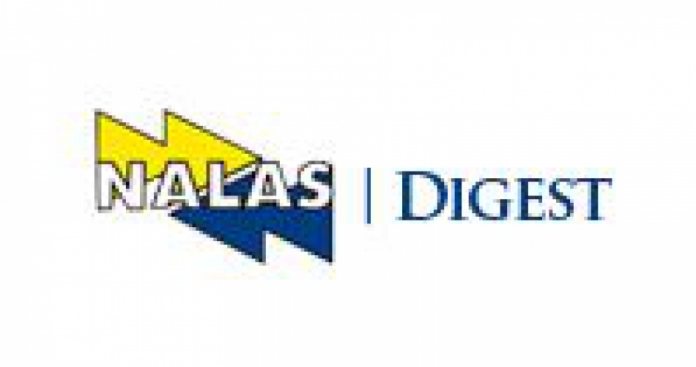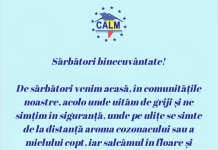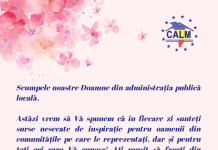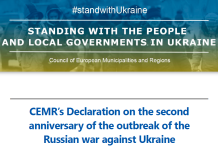Dear reader,
While you read these lines, some fifteen urban planners and urban development experts from the whole South-East Europe, members of NALAS Urban Planning Task Force, meet in Ljubljana, Slovenia, to discuss contemporary urban development challenges in SEE and explore citizens participation in the urban planning process.
The Urban Planning Task Force has great resources within its membership. During this meeting, the Task Force member from Romania, Ms. Claudia Pamfil, offered her expertise in citizens participation and provided an inspiring and interactive training in Citizens Participation in the Urban Planning Process. The Task Force, via several presentations, interactive exercises, case studies and role-plays explored the reasons for a participatory approach, challenges, participation levels and process. Case studies from Romania and Slovenia were shared and analysed.
Maja Simoneti, a Landscape Architect and Spatial Planner from the Slovenian IPoP Institute for Spatial Policies presented the experiences of Slovenia in Citizens Participation in Urban Planning. Ms. Simoneti elaborated several success stories of citizens participation from all over Slovenia related to building GSM base stations, flooding of Ljubljana, building housing communities, creative use of public spaces, etc.
For more information, click HERE.
Enjoy your Digest!
 National Association of Municipalities in the Republic of Bulgaria
National Association of Municipalities in the Republic of Bulgaria
29th NAMRB General Assembly
The 29th NAMRB General Assembly and the first one for the new political mandate 2015-2019 took place on 23 and 24 February 2016 in Sofia. Almost all Bulgarian municipalities sent their representatives to the event and more than 450 participants took part in the organized discussions and the elections of the new NAMRB Governing bodies – the Managing Board and the Supervisory Board. The new Chairman of the Managing Board and practically the new NAMRB President is Mr. Daniel Panov, Mayor of the historical Bulgarian capital – the City of Veliko Tarnovo. He was elected by full majority and was appreciated by all delegates. The new Chairman of the Supervisory Board is Mr. Emil Karaivanov, Mayor of the municipality of Assenovgrad.
The General Assembly adopted important amendments in the NAMRB Statute and approved the Association Activity Program for 2016. The delegates also approved the establishment within the NAMRB structure of a Central Unit for joint public procurements for the municipalities – an opportunity offered to local authorities by the last amendments in the Public Procurement Act.
The General Assembly gave the green light for the establishment of a Municipal Investment Fund, which through the advanced tools of pooled financing shall facilitate the access of small municipalities to investment funding. NAMRB shall lead the efforts in this area as well, employing the proved models and long-time experience of Scandinavian countries.
More information on the newly elected members of NAMRB Governing Bodies at: http://projects-namrb.org/index.php/en/

The NAMRB General Assembly – the registration is open…

The oldest delegate – the Mayor of Chavdar Municipality – is chairing the Assembly till the new Chairman is elected. Sofia Mayor Mrs. Jordanka Fandakova made the opening address.

The Delegates of the General Assembly

At the tribune, the first speech of the NAMRB newly elected President Mr. Daniel Panov

Association of Kosovo Municipalities
The Association of Kosovo Municipalities coordinates its activities with Local Government partners
The Association of Kosovo Municipalities (AKM) has organized its regular meeting “Friends of AKM” with its partners in Prishtina, aiming cooperation and coordination of activities with its partners included in the activities and projects of local government in Kosovo. The AKM Annual Plan, the list of draft laws where AKM will be involved and the training need assessment of Kosovo Municipalities were presented at this meeting.
Mr. Sazan Ibrahimi, the Executive Director of AKM opened the meeting attended by representatives of a number of partners and supporters of AKM, as well as Kosovo Municipalities. Mr. Ibrahimi briefly informed the participants about the nature and purpose of the meeting, emphasized the special role and importance of cooperation with partners working with local governments in various projects on behalf of municipalities and presented the Annual Work Plan 2016 and the list of draft laws of the Republic of Kosovo in which AKM will be involved. At this point, representatives of local government’s partners in Kosovo expressed interest for joint involvement and lobbying for the interests of local authorities.
Mr. Gani Berisha, Program Manager of AKM presented the Training Needs Assessment of Municipal Officials in various fields. This assessment is a result of a list of requests from municipalities and their officials that was made through Professional Collegia.
Participants presented their activities in areas where there may be cooperation and coordination of joint activities with the municipalities in the implementation of clear objectives that these organizations have during their mandate. Certainly one of the challenges still remains a good cooperation of donors in various areas during the implementation of their projects and therefore the interaction of activities should be aimed at organizing a better job in order not to have duplication of activities and projects by different partners. Moreover, it was also requested a more active approach and co-financing of projects in question by municipalities related to joint activities in the improvement of services to citizens in various fields.
Launched eight projects co-financed by the DEMOS project
During the first quarter of 2016, the DEMOS project launched joint projects with eight municipalities of Kosovo. Joint investments in these municipalities aim at improving infrastructure, creating new public spaces and parks, installation and repair of public lightening and traffic safety of citizens.
Besides improving public infrastructure, these projects are also aimed at capacity building of municipal officials in drafting, tendering and monitoring of projects for future municipal investments.
The projects were launched in Viti/Vitina, Ranillug/Ranilug, Gjakovë/Djakovica, Rahovec/Orahovac, Lipjan/Lipljan, Shtime/Stimje, Graçanicë/Gracanica and Pejë/Pec. The total value is around 669.000 euros. During the next month, DEMOS will launch two joint projects with municipalities of Kllokot/ Klokot and Novobërdë/Novo Brdo.

Congress of Local Authorities from Moldova
Mayors learn to involve migrants in the development of their communities Mayors of 25 localities from the Republic of Moldova learned from their fellow colleagues how to involve migrants in the development of their communities within a study visit held on 25-26 February by UNDP Moldova. Local officials visited Selemet and Avdarma Municipalities, where infrastructure and a range of public services were developed, thanks to the involvement of migrants.
Mayors of 25 localities from the Republic of Moldova learned from their fellow colleagues how to involve migrants in the development of their communities within a study visit held on 25-26 February by UNDP Moldova. Local officials visited Selemet and Avdarma Municipalities, where infrastructure and a range of public services were developed, thanks to the involvement of migrants.
Migration is perceived as a negative phenomenon for the Republic of Moldova because, until now, it has not been used as an effective element of the countrys development, in general and of the localities, in particular. All these, due to the lack of institutional capacities, knowledge and viable models, which would enable efficient implementation of the migration policy and local development through an effective programme of involvement and community mobilization. By these visits, we aim to inspire Mayors to follow the example of some localities that have involved migrants to boost local development, said Olesea Cazacu, UNDP Project Manager.
So far, I did not even think how important can be to establish relations with the natives who left the village. The example of these two villages made me understand how these links may be useful for the community, but also for those who miss their home and want to develop the place they had left. I am convinced that important issues to be addressed are the conditions and activities for children. However, most migrants left their children at home. Thus, by creating better conditions for them, such as: sports sections, playgrounds, football fields, various workshops, we have the possibility to build a lasting relationship with migrants said the Mayor of Rusestii Noi Pavel Codreanu.
According to recent studies, about 479,000 Moldovans are migrants, 370,000 are in long-term migration, and 109,000 being circular migrants. Since 2010, migration and development were recognized both by national authorities and the international community as an important development topic on the agenda of the country.
CALM visited by a delegation from China
On 24 February 24, CALM was visited by a delegation from the Chinese Peoples Association for Friendship with Foreign Countries (CPAFFC) and the China International Friendship Cities Association (CIFCA). The aim of the visit was to establish partnership collaboration between the Chinese and Moldovan local governments and between CPAFFC & CIFCA and CALM.
![]()
 Association of Municipalities,
Association of Municipalities,
Association of Cities in the Republic of Croatia
The Monitoring Committee of the CoEs Congress of Local and Regional Authorities visits Croatia The representatives of three national associations of local authorities – the Croatian Association of Counties, the Association of Cities and the Association of Municipalities met with the Monitoring Committee of the Congress of Local and Regional Authorities of the Council of Europe on 2 March. It is a continuous task of the Council of Europe to promote the principles of the European Charter of Local Self-Government signed by 47 countries in Europe, including Croatia that joined in 1997 and in 2008 accepted its full obligations.
The representatives of three national associations of local authorities – the Croatian Association of Counties, the Association of Cities and the Association of Municipalities met with the Monitoring Committee of the Congress of Local and Regional Authorities of the Council of Europe on 2 March. It is a continuous task of the Council of Europe to promote the principles of the European Charter of Local Self-Government signed by 47 countries in Europe, including Croatia that joined in 1997 and in 2008 accepted its full obligations.
According to the rapporteur Ole Haabeth, the mission objective was to exchange views on current issues in functioning of local and regional government, to hear comments from local government and assess the current state. Afterwards a report for the Congress session in October 2016 will be prepared in which recommendations and suggestions will be presented. The Croatian representatives commented on the highly centralized Croatian state and emphasized that at the local level and in the three of the national associations of local self-government there is a general agreement that the reform cannot be reduced to a mere elimination of local units, but that it should be conceived as a functional decentralization while coordinating both the capacity and the rights and obligations of the state.
AoM meets the First Deputy Prime Minister
A delegation of the Association of Municipalities in the Republic of Croatia met the First Deputy Prime Minister Tomislav Karamarko on 2 March in Zagreb to talk about the problems of local governance in Croatia. Many objectives were emphasized: the need for investment in the small municipalities and villages for the purpose of their further existence, improving the process of lease of agricultural land, and the need of efficient use of EU funds. Currently 150 municipalities have in the pipe-line projects worth 300 million euros awaiting implementation. The First Deputy Prime Minister gave support to the proposals of the Association of Municipalities and expressed his understanding for the necessary territorial reform that should be carried out, but by serious and meaningful analysis.
Platform on dealing with the issue of floating waste in the Adriatic Sea
The Association of Municipalities in Croatia hosted the Second Dialogue Platform organized within the project “Solid Waste Management in cross-border rural and coastal areas of South Eastern European region”, implemented by SWG and NALAS, financially supported by GIZ Open Regional Fund Modernisation of Municipal Services (ORF MMS). The aim of the Second Dialog Platform was to present the Environmental and Economic Impact Assessment as a base for development of the proposal on Integrated Solid Waste Management model in cross-border context of the Adriatic Sea coast. In that respect, the platform was used for discussion on the Methodology for Monitoring of the Marine Litter and Marine Litter`s Sources, as well as roles and responsibilities of the relevant stakeholders. Concepts on waste collection and recycling as well as Tourism Waste Collection Organizational Concepts were considered. For more information: click HERE.
 Association of Communes of Romania
Association of Communes of Romania
XIX General Assembly of the Association of Communes of Romania
From 21 to 24 February 2016 ACOR held its XIX General Assembly. At this important event 487 Mayors from all the counties of Romania took part, as well as the Prime Minister of Romania, Mr. Dacian Cioloş, seven Ministers of the Government of Romania, the President of the Committee of the Regions, Mr. Markku Markkula, Ambassadors accredited in Bucharest, delegations of ACORs partner Associations from the country and abroad, the leadership of Congress of Local Authorities from Moldova and the Chinese People’s Association for Friendship with Foreign Countries.
All the seven Ministers that took part in the event responded to Mayors questions and tried to help them to solve the problems their commune is facing. The President of ACOR Mr. Emil Draghici handed diplomas and trophy for the Mayors with six consecutive terms as Mayor.
EU invests in new technologies in Romania
The President of the European Committee of the Regions (CoR), Markku Markkula, promoted a €300m EU-funded laser project in Romania stating that it demonstrates how EU investment and working in partnership can stir innovation and regional development. Accompanied by Romanias Minister of National Education and Scientific Research, Adrian Curaj, and the Minister of European Funds, Aura Carmen Răducu, President Markkula visited the Extreme Light Infrastructure cross-border project which is expected to create the most powerful lasers in the world.
By working in partnership, central and local governments, universities and the business sector can lead cutting edge science. Smart specialisation can positively impact urban and rural development by investing EU structural funds in innovation, said President Markkula. During the one day trip to Bucharest, President Markkula also spoke alongside Romanias Prime Minister, Dacian Cioloș, at a conference organized by the Association of Communes of Romania. At the event both Emil Drăghici, the Associations President, and Alin Nica, Head of the CoRs Romania Delegation, stressed that rural areas had an important role for growth and increasing the quality of life in Romania. President Markkula supported this stating that It is positive to see the work being done in Romania to tackle the rural-urban divide by promoting regionalisation and making the most of EU funding. We need to speed-up investment by simplifying the EUs cohesion policy, improve local administrations capacity building and adjust public procurement rules. President Markkula also welcomed Romanias efforts to support regionalisation during his bilateral meeting with the Deputy Prime Minister, Vasile Dîncu, who was ready to use the CoRs knowledge to promote devolution and regionalisation in Romania. The Deputy Prime Minister said thatPromoting regionalisation and supporting local governance is a major objective which is why we very much welcome the CoRs opinions. The Romanian Government is making every effort to tackle bottlenecks, cut red tape, modernise public administrations and make EU investment support the most underdeveloped regions.
***
OTHER INFORMATION
2016 Guangzhou International Award for Urban Innovation (the Guangzhou Award)
The Guangzhou Award aims to recognize innovation in improving social, economic and environmental sustainability in cities and regions and, in so doing, to advance the prosperity and life quality of their citizens. The Award is co-sponsored by the United Cities and Local Governments (UCLG), the World Association of the Major Metropolises (Metropolis), and the City of Guangzhou.
Prize:
The Guangzhou Award will be discerned to five (5) cities for each award cycle. Each of the winning cities will receive a USD 20,000 cash prize, a trophy and a commemorative certificate.
Submission Process:
Submissions must be made in accordance with the registration and application forms, which could be downloaded from the official website of the Guangzhou Award at http://www.guangzhouaward.org.
Timetable:
| 31 May 2016 | Registration deadline |
| 30 July 2016 | Submission deadline |
| August-September | Technical Committee evaluation |
| October | Short-listed initiatives are notified of selection and may be requested to send additional supporting materials |
| November | Final selection by the Jury; the Guangzhou Award Ceremony |
For more information, please contact the Guangzhou Award Secretariat at:
Website: http://www.guangzhouaward.org
Email: info@guangzhouaward.org
Tel: +86 20 66289390
Fax: +86 20 66289391










